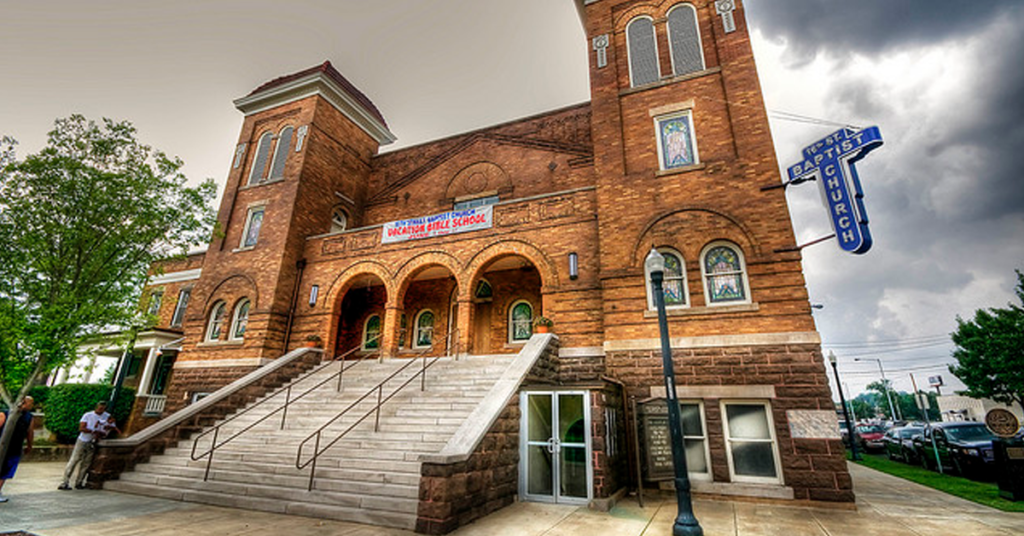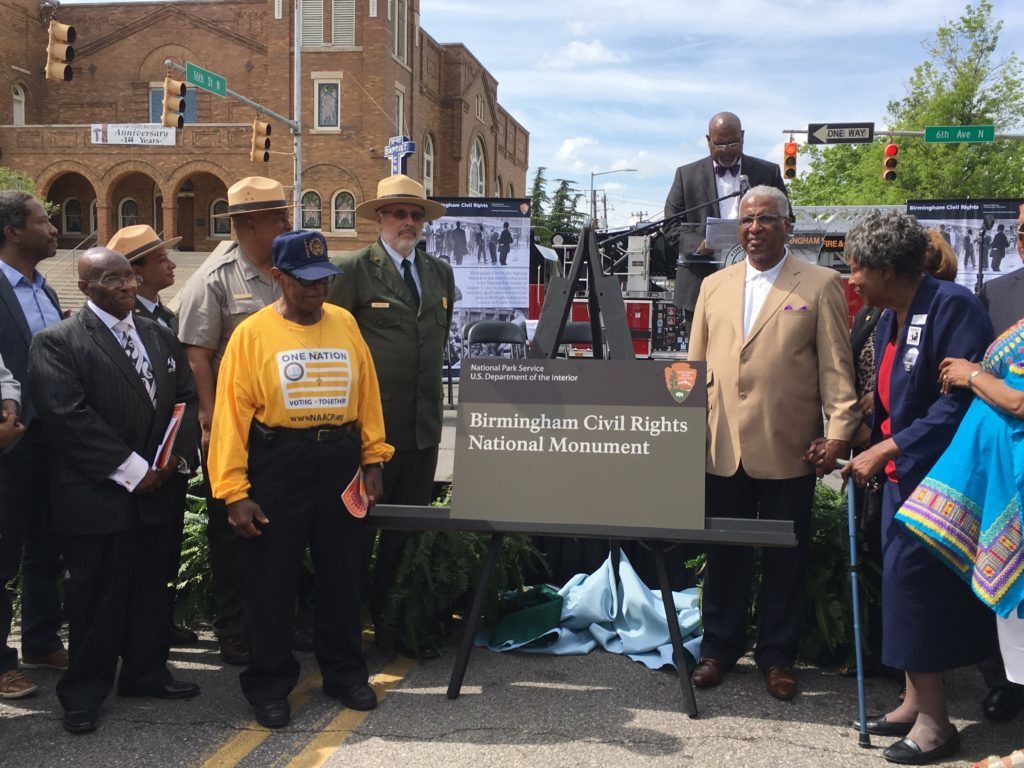Marchers to commemorate 1963 Children’s Crusade in Birmingham this weekend

This weekend, on the 55th anniversary of one of Birmingham’s most famous civil rights protests, the Children’s Crusade, hundreds of children from Birmingham and the nation will join those who experienced the protest firsthand to march to commemorate the events of 1963. Jack and Jill of America, Inc. and the Birmingham Civil Rights Institute have planned two separate events for this weekend in and around Kelly Ingram Park and the Sixteenth Street Baptist Church. Dozens of the original “foot soldiers,” will have prominent roles in both events. The Birmingham Civil Rights Institute event will feature a recreation of the original marches. At 10 a.m. Saturday marchers will gather at St. Paul United Methodist Church on 6th Ave North. The church was one of two churches used for the 1963 protests to gather the young marchers and give them instructions before heading into Kelly Ingram Park. “The Power of Children: Then and Now,” hosted by Jack and Jill Inc. is a three-day event which takes place at the Birmingham Jefferson Convention Complex and the Sixteenth Street Baptist Church and includes a commemorative march at 2 p.m. on Saturday from Kelly Ingram Park to Railroad Park. “When you think about the pivotal role that children played, not just in civil rights history but in U.S. history in Birmingham, and it is critically important that our young people know that,” Jack and Jill President Joli Cooper-Nelson told AL.com. “So this weekend is about educating, honoring, remembering, inspiring, and celebrating.” Jack and Jill is expecting up to 2,000 of its members and their families to participate, with many families traveling from outside Alabama. “We have determined based on the response we’re getting that this will be the first of many annual commemorations of the children’s march,” Birmingham Civil Rights Institute CEO, Andrea Taylor told AL.com. “Because I can assure you that five years from now, 10 years from now, 25 years from now, even half a century from now, there will be issues of concern in the moment that young people want to engage with and can be change agents about.” The original marches were a major turning point in the Civil Rights movement. Thousands of children were trained by movement leaders in the tactics of non-violent protesting. May 2, 1963 they left the 16th Street Baptist Church in groups, marching throughout the city to peacefully protest segregation, but were not met with a peaceful response. On the first day of the protest, hundreds of children were arrested. On the second day, Commissioner of Public Safety Bull O’Connor ordered police to threaten the children with police dogs, spray them with powerful water hoses, and hit them with batons. Pictures and stories of the violent crackdown on peacefully protesting children in Birmingham circulated throughout the nation and the world, and caused a major outcry on their behalf, eventually leading to the desegregation of businesses and marking a significant victory in Birmingham.
Alabama to receive over $2.3 million in grants to preserve civil rights history

On Monday, the U.S. Department of the Interior, and the National Parks Service announced $12.6 million in grants to fund 51 projects in 24 states across the nation. The grants have been provided to preserve sites and highlight stories connected to the Civil Rights movement, and events leading up to it. Alabama itself will be receiving over $2.3 million in grants for projects within the state, including the repair and preservation of the historic Sixteenth Street Baptist Church in Birmingham Ala., and the restoration and rehabilitation of the Perry County Jailhouse. in Marion, Ala. “An integral part of the Interior and National Park Service mission is to help preserve and tell America’s story,” said Ryan Zinke, U.S. Secretary of the Interior. “These grants will benefit places across the nation that help tell an essential piece of that story through the African American struggle for civil rights and equality.” “Through the work and engagement of public and private partners, these grants will preserve a defining part of our nation’s diverse history,” Dan Smith, Deputy Director of the National Park Service said. “By working with local communities to preserve these historic places and stories, we will help tell a more complete narrative of the African American experience in the pursuit of civil rights.” A full list of grants designated for Alabama and the projects they will be funding is as follows: Alabama The Restoration of Mount Zion A.M.E. Zion Church Memorial Annex Mount Zion Center Foundation, Inc. $500,000 Alabama Restoration and Rehabilitation of the Perry County Jailhouse Perry County Commission $500,000 Alabama Preservation, Repair and Restoration of the Historic Sixteenth Street Baptist Church: Phase III Sixteenth Street Baptist Church $500,000 Alabama Moore Building Master Plan and Phase I Rehabilitation Alabama Historical Commission $365,720 Alabama Second Phase Continuation in the Preservation of Brown Chapel AME Historic Brown Chapel AME Church Preservation Society, Inc. $300,000 Alabama 21st Century Preservation & the Next Generation of Global Activism: Archives Preservation and Digitization Project Birmingham Civil Rights Institute $44,918 Alabama Civil Rights Struggle in the Shoals University of North Alabama $45,364 Alabama Freedom Rides Museum 60th Anniversary Commemoration Exhibit Plans Alabama Historical Commission $50,000 Alabama Montgomery Alabama Civil Rights Survey/Planning/Research/Documentation City of Montgomery $50,000
Birmingham celebrates its place in history with Civil Rights National Monument sign unveiling

The new sign for the Birmingham Civil Rights National Monument was unveiled during a dedication ceremony Saturday afternoon in downtown Birmingham. For Alabama 7th District U.S. Rep. Terri Sewell getting the site recognized as a national monument has been a labor of love. Since 2015, she’s worked to bring stakeholders and federal policymakers together in the Magic City in support of creating the Birmingham Civil Rights National Monument. In 2016, Sewell continued her efforts and introduced legislation, supported by the entire Alabama congressional delegation, urging creation of a national civil rights monument in Birmingham. Later that year, Sewell and Birmingham Mayor William Bell hosted Interior Secretary Sally Jewell and National Park Service Director Jonathan Jarvis for a tour of Birmingham historical sites and a public meeting with the Birmingham community. Her efforts finally paid off when President Barack Obama designated the site the Birmingham Civil Rights District as a national monument just days before leaving office in January 2017 using his authority under the Antiquity Act. “Birmingham was the epicenter of America’s civil rights movement, and the Birmingham Civil Rights National Monument recognizes the remarkable contributions made by the foot soldiers and leaders of the movement,” said Sewell, who was unable to attend the event due of the funeral of her father. “We can never repay the debts we owe to those who fought, bled, and died to secure the blessings of liberty, equality, and justice for all Americans during the struggle for civil and voting rights. The Birmingham Civil Rights National Monument will help preserve their stories for future generations. I am thrilled at the investments the National Park Service is making in Birmingham as part of the national commitment to protecting the legacy of our nation’s civil rights heroes.” The national monument — which includes the Sixteenth Street Baptist Church, Bethel Baptist Church, the Birmingham Civil Rights Institute (BCRI), the A.G. Gaston Motel, parts of the 4th Avenue Business District and Kelly Ingram Park, where protesters were hosed down in unimaginable showdowns during the civil rights movement — highlights civil rights demonstrations in Birmingham in 1963 held against legalized segregation. “We can read textbooks and learn about different things, but I still think American citizens learn best when they go see, touch and feel the history that the National Park Service is preserving for future generations,” said Reginald Tiller, acting superintendent of the national park, in a video for the City of Birmingham.


